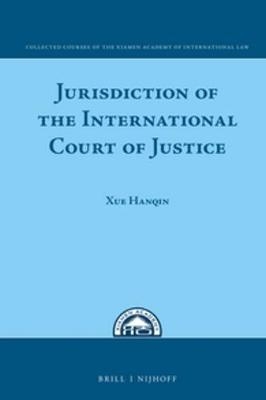
Jurisdiction of the International Court of Justice
Martinus Nijhoff (Verlag)
978-90-04-34275-0 (ISBN)
The International Court of Justice, principal judicial organ of the United Nations, plays an important and unique role in the peaceful settlement of international disputes. As a third-party mechanism, it is a highly technical and well-structured institution. Through its continuous and consistent jurisprudence, it provides legal certainty, stability and predictability to the interpretation and application of international law.
This special course intends to introduce some general concepts that underlie international adjudication and the basic rules and principles governing the competence and jurisdiction of the Court. Notwithstanding its prominence, the Court does not have a general and unconditional competence in dispute resolution. Its jurisdiction is based on the consent of the States, both in general terms as well as in each specific case, which reflects the attributes of the State system. Jurisdiction is a substantive matter. The Court’s decision on the question of jurisdiction is no less important than on the merits.
Xue Hanqin, LLM, JSD (Columbia); currently Judge of the International Court of Justice; former Director-General of the Treaty and Law Department of Ministry of Foreign Affairs of China; member of the International Law Commission (2001-2010); member of Institut de droit international; Vice President of the Chinese Society of International Law; President of the Asian Society of International Law (2009-2011).
1 Introduction
1 A Historical Review
a European Arbitrations in the 19th Century and the Permanent Court of Arbitration
b The First World Court—pcij
c The World Court under a New Order
2 A Hindsight—70 Years’ Experience
a The Initial Success—1946 to 1965
b A Dormant Period—1966 to 1984
c Towards a Revival—1985 to 1990
d New Challenges—1991 to the Present
2 The General Concepts
1 The Concept of Jurisdiction at International Level
2 Competence and Jurisdiction
3 Jurisdiction and Admissibility
4 Justiciability
5 Judicial Propriety
6 Non-appearance
3 Basic Rules and Principles—Part One
1 The Importance of the Principle of Consent
2 Modes of Expression of Consent
a Consent Granted by Agreements
b Consent Conferred by a Declaration of Acceptance of Compulsory Jurisdiction
c Consent Based on Forum Prorogatum
d Consent Derived from Other Sources
3 Mutuality and Reciprocity
a Scope of Consent
a Reservations and Conditions Attached to the Consent
4 Withdrawal of Consent
4 Basic Rules and Principles—Part Two
1 The Principle of Finality, res judicata
a The Concept of res judicata
b What Constitutes res judicata
2 Article 59 of the Statute—The res inter alios acta rule
a The Scope of res inter alios acta
a Protection of the Interest of the Third Party
3 The Monetary Gold Rule
4 The non ultra petita Rule
5 Preconditions for the Exercise of Jurisdiction
1 Existence of a Dispute
a The Notion of a Dispute
b Determination of the Existence of a Dispute
c The Relevant Date and the Existence of a Dispute
d The Subject-matter of a Dispute
2 Negotiation and Other Preconditions for the Seisin of the Court
a Prior Negotiation as a Condition
b Precondition Attached to Declarations Accepting Compulsory Jurisdiction of the Court
c Precondition in a Compromissory Clause
6 Competent Parties—Jurisdiction Ratione Personae
1 States—Access to the Court and Jurisdiction ratione personae
a Members of the United Nations
b Non-members of the United Nations
c Access to the Court in Case of State Succession
d The Role of States in Advisory Proceedings
2 International Organizations
a The Role in Contentious Cases
a Requests for Advisory Opinions
3 Jurisdictional Issues in Incidental Proceedings
a Interim Protection
a Intervention
c Counter-Claims
7 Subject-Matter Jurisdiction and Temporal Jurisdiction
1 Jurisdiction ratione materiae
a The Concept of Subject-Matter Jurisdiction
b The Title of Jurisdiction
c Multiple Titles of Jurisdiction
d Identification of the Subject-Matter
e Jurisdiction ratione materiae and Obligations erga omnes
2 Jurisdiction ratione temporis
8 Objections to Jurisdiction and Admissibility
1 Jurisdiction as a Matter for the Court to Decide
2 Preliminary Phase—Possible Bifurcation of the Proceedings
3 Decisions on Preliminary Questions
Conclusion
Bibliography
List of Cases
Index
| Erscheinungsdatum | 24.07.2017 |
|---|---|
| Reihe/Serie | Collected Courses of the Xiamen Academy of International Law ; 10 |
| Sprache | englisch |
| Maße | 155 x 235 mm |
| Gewicht | 558 g |
| Themenwelt | Recht / Steuern ► EU / Internationales Recht |
| Recht / Steuern ► Öffentliches Recht ► Völkerrecht | |
| ISBN-10 | 90-04-34275-3 / 9004342753 |
| ISBN-13 | 978-90-04-34275-0 / 9789004342750 |
| Zustand | Neuware |
| Haben Sie eine Frage zum Produkt? |
aus dem Bereich


